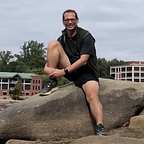Managing PTSD and Wellness in Tough Times
Post-traumatic stress disorder combined with alcohol to tear me apart, and recovering from one required dealing with the other. As I’ve written about elsewhere, the process required doing a deep dive into the mechanics of PTSD to understand how it had changed my neurophysiology and learning strategies to change how I dealt with stress. What I could never have predicted, however, was the challenge presented by a viral pandemic.
My most important discovery early in the process was to learn what an attack felt like, as I wrote about here. Knowing what the first signs of an attack were enabled me to head off an attack when I felt the first tingles. My friend Jerry, a Vietnam vet who counsels other vets with PTSD, has learned that his chest tenses up when he is triggered and that he will sometimes catch himself socially isolating before he realizes an attack is happening. Recognizing these reactions lets him know that he either needs to shake out the energy or get out with friends — something that is particularly difficult right now.
In my case, fitness has been crucial to managing the attacks I used alcohol to combat in the past. Because my fight-or-flight system is heightened, I live with more cortisol coursing through my body than someone whose autonomic nervous system was not altered by acute trauma. Not releasing that constant stream can mean reacting easily and out of proportion to stimuli, which can in turn feed back into an attack. Releasing the energy through exercise — weights, running, yoga, hiking, and cycling in my case — offers relief and flips the equation so that I can move forward. In addition to giving my conscious mind something tangible to focus on, the endorphin release helps balance my neurophysiology.
In addition to putting someone in a constant fight-or-flight state, acute trauma changes the vagus nerve, hypothalamus, and pituitary gland, as well as altering the balance between the lizard brain and the frontal cortex. Exercise encourages the flow in all of these systems, and in particular requires learning how to breathe properly. Getting these systems working properly again is crucial to regaining the body’s natural balance. Finding this homeostasis also assists with managing my general response to stress, too.
One way, for example, that I know I’m starting to hold stress in — and possibly be triggered — is that I catch myself not breathing. Since the pandemic started to gain steam and closures happened, I have caught myself forgetting to breathe a little too often. This is partly because losing the gym meant losing a crucial fitness routine. It has also meant feeling frozen and out of control; after all, what is more out of control than not knowing if you’re going to catch a potentially deadly virus anywhere you go?
That’s where slowing down becomes essential. Before the closures, I was rushing from workouts to appointments to work, and I was working aggressively to confront the literal effects of the shooting that caused my PTSD. Then: full stop. At first, I kept moving a little bit, getting bits of exercise where I could. I started riding my bike again for the first time since November, and it helped a bit. I was struggling more than I thought I should be, though, and not feeling the release I expected.
So I took a few days off. I gave myself a break. I stretched and breathed. Then, I went for my first real run in a month. It was only four miles, but it was still four solid miles at a 9:15 pace. I had been holding in the fear and uncertainty of the quarantine without paying close enough attention to the things that mattered, and when I made that realization, I was able to stop, take a breath, and remember how to move forward once again. The next day, I went for a ride and focused on my breathing. Where I had struggled for 15 miles a week earlier, I rode 25 and felt strong the whole time. I even felt the racial release of my body relaxing from my fascia to my fingertips.
In the week since that revelation, I have added a little more focused activity each day. This mindful approach has allowed me to build new routines and feel a little more settled in unsettled times.
